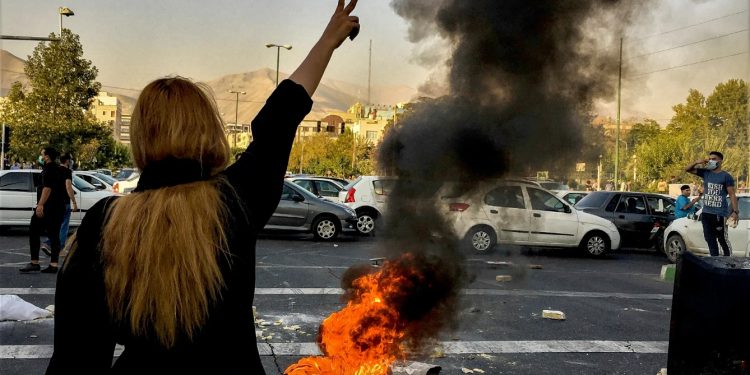The political goal of the young women, youth and children in the recent revolution lies in the philosophy of their revolutionary slogans. In the last four months, the process of this social political transformation has been flowing throughout the Iranian society, Iranian communities abroad as well as the rest of the world.
Disseminating the seeds of life at a time when economic crises and inefficient political management of the Islamic system have made daily life difficult and uneven, can only be done by Iranian women. After four decades of life under the rule of political Islam, Iranian women resisted oppression on different legal, economic, social, and political layers. But these layers of resistance have become such a powerful force that the system of repression with force, daggers, bullets, rape and execution is no longer the answer to this revolutionary roar. Toppling down this authoritarian system takes time, but it is possible.
Removing veil and fighting against this long antagonist policy in the last four decades eventually took the new generation of women and men to the streets. This process of transformation provides a ground for thinking of changing the constitution and working on a new one, which emphasizes women rights and family rights. In this four-decade fight, women had begun to fight against the system of oppression once in 1979 when the Islamic establishment came to power and removed family rights from the constitution, as the Islamists shook their houses overnight like an earthquake and put fire in their lives and world. Their right in higher education and many professions have gone under restrictions. The constant isolation from social and economic life led them to begin the fight and struggle with patriarchy at home during the last four decades. This long resistance and fighting process taught women that liberation, freedom and a return to normal life are achievable.
But what has happened in the cultural and social revolution has brought men to the battle scene with this Islamic Zombie which is the core of this patriarchy. In this historical period, even the patriarchal laws have pushed back the chance of the continuation of this purely force-oriented patriarchal system. Because removing the majority of men and women from the economy and life cycle has led to a rethinking of this whole corrupt system. Although today’s revolution raises the issue of overcoming this binary of men and women, regardless of their language, ethnic and religious background, freedom and national pluralism of Iran should be all respected. Achieving to this depth scale of political awareness has not been so easy and it costs losing many of the social capitals of this society. This level of awareness is reaching to the opposition groups abroad.
During these four months, the Islamic Republic has clearly committed to the genocide of women and men in teenage years, the main engine of this revolution, and intends to eliminate people who are leaders and inspirations among their social groups by execution, rape and torture in every town and city. But the experience of removing the most mobilized different political group members from four decades ago has given the Iranian nation the insight that even this political violence cannot extinguish the flame of the revolution.
This revolution is raging every day and has brought out the class and ethnic layers in the cities that were silenced by the repression of the system. The taking to the streets of women, youth and men of Balochistan and the fateful Fridays in the streets of Zahedan, Khash and other areas of Sistan and Baluchistan give the glimmers of hope to the whole process of this revolution. Execution of the barrage of participants in Friday prayers and many participants after the end of Friday, and the executions of teenagers and young people in this region has motivated this uprising. Military rule is in place in some cities of Kurdistan province, and hidden executions continue as in other provinces. Kidnapping of girls and boys, torture and rape are going on in Khuzestan province (the Arab region) like in other cities.


